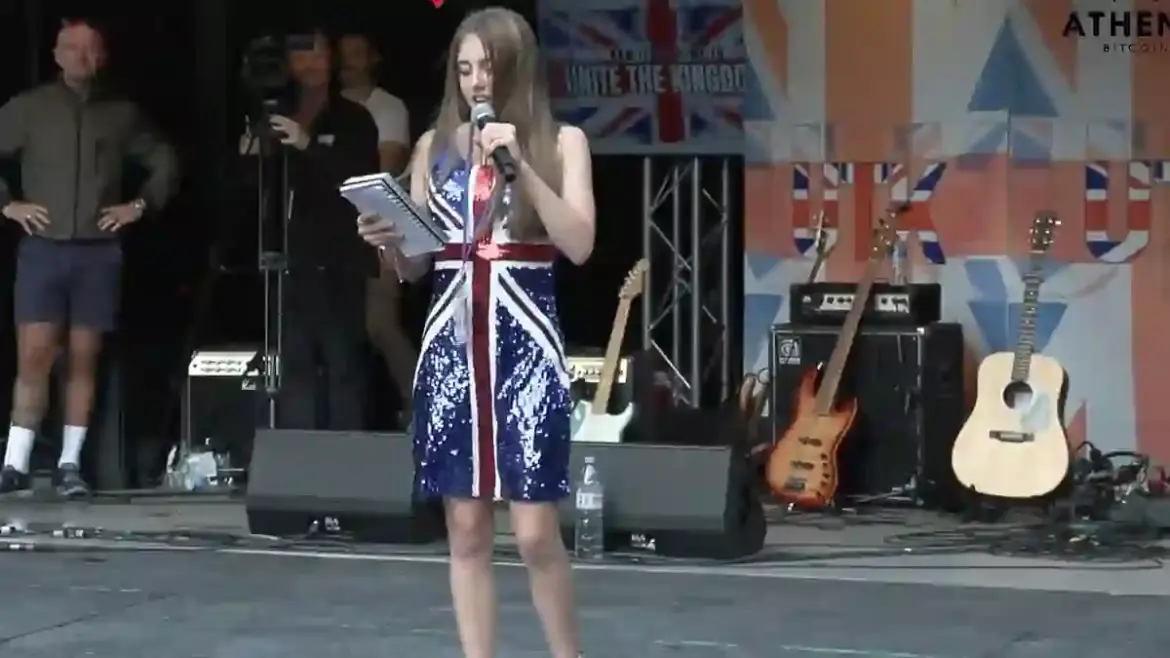What started as a disagreement over a dress at a school in Rugby has spiraled into a headline-grabbing moment on the national stage.
Thirteen-year-old Courtney Wright, a straight-A student, found herself banned from class after she was told she couldn’t wear her Union Jack dress for Culture Day.
Months later, she stood before more than 110,000 protesters in London, passionately declaring that “British culture matters too.”
From Isolation to the Main Stage
Courtney’s troubles began in July when staff at Bilton School stopped her from wearing her Spice Girls-inspired Union Jack dress.
She had planned to give a speech on British history and traditions but was pulled from class, placed in isolation, and later sent home when her father came to collect her.
Fast forward, and she was being introduced to a roaring London crowd as a “brave little British girl” by activist Tommy Robinson.
The reception couldn’t have been more different—applause, whistles, and cheers welcomed her as she delivered her speech for the first time.
A Proud Declaration of Identity
Taking the microphone, Courtney told the crowd she was “so proud to stand here today.”
She spoke about Britain’s values, its history, and the sacrifices of past generations, saying it was the duty of young people to “love it, respect it and keep it strong.”
She went on to argue that her school had silenced her voice, before asking the crowd if she could finally read the speech she was meant to give to her classmates.
Their enthusiastic response gave her the stage she had been denied.
The Speech That Sparked Cheers
In her address, Courtney highlighted the quirks and traditions she associates with being British—tea drinking, talking about the weather, Shakespeare, the royal family, castles, and even fish and chips.
She stressed that Britain is both modern and diverse, shaped by cultures from around the world, but warned that sometimes “being British doesn’t count as a culture” in school discussions.
Her message was simple: all cultures should be celebrated, including those at home.
“Being British is still a culture and it matters too,” she concluded, drawing huge applause.
A Rally of Controversy
Courtney’s speech came at one of the largest right-wing demonstrations in British history.
Organized by Robinson, whose real name is Stephen Yaxley-Lennon, the protest marched from Waterloo Bridge to Whitehall, with participants waving Union Jacks, England flags, and even banners honoring U.S. conservative activist Charlie Kirk, who was recently shot dead.
High-profile figures including French politician Eric Zemmour, German AfD member Petr Bystron, psychologist Jordan Peterson, commentator Katie Hopkins, TV personality Ant Middleton, and former actor Laurence Fox were all in attendance.
Parents Push Back at School Decision
Courtney’s treatment at Bilton School has drawn sharp criticism from parents.
One father, whose daughter attends the same year, said he was “disgusted” that Courtney had been singled out.
He pointed out that other pupils wore traditional Asian dress or Scottish tartan without issue, asking why the Union Jack was deemed unacceptable.
The backlash grew so intense that the school’s governing trust later apologized.
Reaction From Downing Street
The controversy reached as far as Westminster.
Prime Minister Sir Keir Starmer’s spokesperson reiterated that being British is something to be celebrated.
“We are a tolerant, diverse, open country, proud of being British,” the statement read—seemingly aligning with Courtney’s argument.
What Comes Next?
Courtney Wright’s moment on stage has catapulted her into a wider debate about culture, identity, and free expression in schools.
For some, she has become a symbol of pride in British traditions.
For others, her platform—shared with controversial figures—will spark further scrutiny.
The question now is whether her story becomes a one-off flashpoint or the start of a much bigger conversation about what it means to celebrate “British culture” in today’s diverse society.
